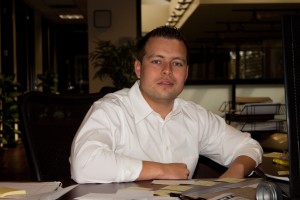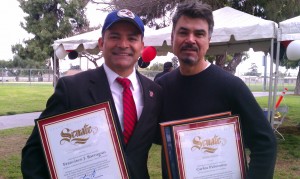.
.
.
 US Marine Corporal Miguel Vazquez, served two combat tours in Iraq,
US Marine Corporal Miguel Vazquez, served two combat tours in Iraq,
and he shares his Traits for Success as an Entrepreneur after combat.
Miguel comes from a long family tradition of military service to country
Interview by Francisco J. Barragan CPA, CIA – Commander of UMAVA (United Mexican-American Veterans Association)
Miguel where did you grow up?
I grew up as a Marine Brat in Southern California, but also spent time on the east coast. I think the moving and living in different places shaped my personality and my ability to adapt to something different.
Who are your role models?
My role models from an early age were my parents because they were Marines, especially my mother who worked as a single parent to provide for our family. She never set boundaries in what she would do for her children, and also in what she expected out of us. It was this high standard that helped me realize persistence and perseverance pay off. As I got older my uncle/Godfather was a good role model who helped guide me to my current profession. He also served as a Marine and in law enforcement. After military service he moved from stock broker, to institutional money manager and now current Principal of our firm. From a young age, I would go to work with him as he helped guide me in many areas of my life in and out of business.
Why did you join the military?
Joining the military was something I always knew I was going to do. As a young kid I would run around in camouflage as much as possible. The day of September 11th 2001 had to be a defining moment where I knew I was destined to serve especially since my father was in the Pentagon when it was hit and my family had just returned from NYC. After graduating early from high school, I made the commitment to the Marine Corps. I did not know where I would serve in the future but at least knew I would be in the “batter’s box”.
What interpersonal and technical skills did you learn in the military that you did not have before?
Growing up, I have always been a decently well-rounded individual. But when I joined the Marines I learned and refined so many different skills I thought I had, but really had no idea how to apply. Some of those interpersonal skills come with being a leader.
- I learned how to communicate clearly no matter the situation and how to be as dauntless as possible in my decision-making.
- Some combat environments and situations really help an individual realize what it takes to meet an objective, work as a team, but always being an individual others can depend on.
- Combat and the training leading up to being overseas helped me refine many of the key leadership traits taught in the Marines Corps (Justice, Judgment, Dependability, Initiative, Decisiveness, Tact, Integrity, Enthusiasm, Bearing, Unselfishness, Courage, Knowledge, Loyalty and Endurance.) All of these have been key qualities to display and know especially in my pursuits within my current industry.
As I entered the investment industry in one of the worst economies and market cycles to-date, my clients and people I work with have come to rely on my guidance, and trust my advice as we navigated many of the markets minefields. Being a young man in an industry where the average age is around 48 – 50, the life experience I have had up until this point has been priceless.
Where did you go to college and what degree or license(s) do you hold?
When I first transitioned out of the Marine Corps I already had completed two of the necessary licenses (Series 6 and 63) needed to get started in helping advise clients with their mutual fund investments. As I got group and individual advising and investment experience, I completed my Series 7 which is in itself a challenge and coveted license to hold since it gave me the ability to work with stocks. This was something I always dreamt about as I was growing up. I still have many other licenses in my industry to complete, and I am also working on completing Economics bachelors degree. Through the Post 9-11 GI Bill and the guidance of a great Veteran Advocate at Orange Coast College, I am chipping away at that degree by the semester. I have been afforded a priceless opportunity to have learned what I know now about the economy, investment markets and asset management from on-the-job-experience and continuing industry education. It is here I have found my “hedge” against not having my degree done ahead of entering the industry.
What does your business do?
Our firm Hoplon* Financial Group is a full service financial firm specializing in retirement planning on a group and individual level. I am a Vice President and work with a lot of corporate and nonprofit retirement plans along with countless individuals. Our firm also has an investment division focused on advising institutions and individuals on many different types of investments and traditional money management. Our last division brings our clients an assurance through insurance. The goal for our firm has been to be a full service financial presence in the southern California region. Naturally we have clients across the country and in turn have a national presence.
Hoplon: Shield used by Spartan warriors in battle and known to be indestructible.
 Who are your typical customers?
Who are your typical customers?
Our customer base ranges from middle-class to high-net worth individuals and families. We have wide ranging corporate clients as all of their industries are different, but all provide a group retirement plan in which we advise and have found a niche in doing so. We help fill the void many investors feel when they do not have someone to rely on for unbiased independent advice. By providing company sponsored retirement plans our client base expands across all income and educational levels. Since our firm is bilingual in five languages we also have a presence in much of the Hispanic and Vietnamese client base.
Who else could use your services?
The focus of our firm’s services has always revolved around being not only a trusted advisor but an advisor that works with our clients in a team fashion. By doing so, we find meeting an investor’s goals on an individual, institutional or corporate level much easier to achieve since our team works together for the greater good of the client. Unfortunately, this is an area I believe many in our industry have forgotten. So to answer this question, any individual or company who is ready to begin the trek to better financial wellness is opportune to work with Hoplon.
What skills from the military were most transferable to your business?
Many of the same responsibilities and priorities have carried over from the military to business. Whether we are talking about the different leadership traits, to accountability and responsibility, I feel that a lot of my experiences from the military help me in how I advise my clients. I explain to my clients that my prior life experience was being able to brief and orientate fellow infantryman ahead of battle to limit the loss of life. In managing assets, I use the same concepts to preserve the financial livelihood of my clients.
What were your most immediate challenges when you returned from combat?
Some of the biggest challenges I faced per my return from combat were re-acclimating back into a society that hadn’t skipped a beat since we had left. My second combat tour was tougher than the first on many levels, and it was very hard readjusting to life without the threat or thrill of combat. Now I understand why I like working so much with the stock market, whether it is an up-day or down-day the market is always changing. In turn, I find myself having to change with it and being a trusted guide to get everyone to where they need to be financially. Carrying a lot of the mentality back from the combat zone is a tough thing to figure out, and it has been a work-in-progress, but I finally discovered a balance, and I feel blessed for this. Without the balance I now have in work and in school, both would be harder to commit my entire self to. Through my combat experience and daily work on myself, I find each day is a blessing, and also a day to make the most of in anything I do.
What was the most challenging aspect about starting and running your business, and how has your military experience helped you in this?
Two words: Adapt and Overcome!
By stepping into this advisory industry, I realized that accountability, attentiveness, and oversight are as necessary as they were when I would be on patrol. In starting from zero , I always knew that no matter how hard it was going to get, it was better to face these challenges with my head up, just as we did overseas. The biggest difference I saw in starting a business versus serving in combat overseas, was I knew no matter how bad the market-day, I would live to be around for the next day. Combat has a funny way of teaching you not only an appreciation of life but also a realization that if one can survive life and death on a daily basis, one can survive any business or economic cycle in the business world.
What are your personal and business goals?
I hope through the work I have put in thus far, and the ton of future work ahead of me, I hope to strive to be able to provide opportunity for others and hopefully a legacy for my family. Being of service to this great country of ours, runs very deep in my family, and my goal is to give my future family options so they know they have something they can rely on pre- or post-service. I continue to find ways to serve my community and whatever little piece of the world I can have a positive influence on. I have seen both sides of the spectrum here at home and in the world, and I am thankful to have the opportunity I have now and will continue to grow personally and professionally in an honorable manner.
How are you assisting, or how does your business allow you to assist other veterans?
My service to fellow veterans was coincidental in every way. As I became proactive in re-adapting after my military service, I realized I needed to share what had worked and what hadn’t worked for me, especially as we coped with combat PTSD. I also made it a point to use on my fellow veterans, the same subtle persistence I use in sales. By continuously being in their ears about how they need to help themselves for their own sake and most importantly their loved ones sake, many turned to me to help guide and mentor them in what they were doing and what they were going through. I found myself in a leadership position, although I was merely the same as they were. I know that the only difference is that I brought an understanding that was never judgmental. To understand one another, one has to understand what it is to work from the ground up. By denying this reinvention of one’s self only complicates matters. So to help, I always let my fellow combat veterans know that they can rely on me the same way they relied on whomever they served with. Through my business I have helped connect veterans not only with all of the veteran services available to them, but also opportunities in employment. Veterans make up 75% of our firm, and this makes running our firm easier and more professionally disciplined than most.
How do you define success for your clients and for yourself?
My definition of success for my clients is being able to carry on a financial legacy that will help their families for years to come. Success for me is being able to execute what I do in a professional manner and in turn build a business that builds its own legacy for the future.
What advice would you give veterans to help them readjust to civilian life?
The best advice I could give returning veterans readjusting into civilian life is to remain open-minded, understanding, persistent in all things they take on, and remaining positive to life. Re-acclimation takes finding a balance, and finding the balance takes patience. Everyday will be a challenge but challenges are nothing new to those who serve. As veterans we have to ensure that we do not disgrace the sacrifices of our brothers and sisters by not-continuing-to-live, and by making something of ourselves.
What advice would you give veterans that want to start a business?
Any veteran who is looking to start a business has to be ready to get back into the trenches, and realize the scope of their duties are unlimited. I cannot emphasize enough the old Marine principle of “Adapting and Overcoming” and always persevering. The same warrior who fought overseas is a warrior who can lead a successful business.
How can others help veterans start a business?
Others can help veterans through encouragement, support and a solid belief in them.
What inspires you?
Faith in a Higher Power and in me, loving Life and my loved ones, and pursuing the opportunities for my business and the future avenues a successful business can open the doors to.
.
BONUS ITEMS for this Veterans Day:
Carlos Palomino former World-Boxing Champ, Movie Actor, Entrepreneur, US Army Veteran, and UMAVA Honorary member, was also featured in Caypen Magazine volume 3, “A Different Brand of a Boxer”

From L: Francisco Barragan, and Carlos Palomino at the March 2011 Annual Cesar Chavez Celebration in Santa Ana. (Cesar Chavez joined the US Navy at 17, and served in the Pacific during WWII.) Francisco & Carlos were recognized by State Senator Lou Correa and Assemblymember Jose Solorio, along other UMAVA members for service to country and contributions to the community.
.
The above interview of Miguel Vazquez “Adapting & Overcoming” originally appeared on volume 7, November 10th, 2011 in Caypen Magazine, pages 54-57, an online entrepreneur magazine, published from Orange County, CA. There is a wealth of information there for any entrepreneur!
 Happy Veterans Day & Happy 236th Birthday my Marine Brothers (November 10th)
Happy Veterans Day & Happy 236th Birthday my Marine Brothers (November 10th)
.
Francisco J. Barragan CPA, CIA
An experienced audit professional and consultant with extensive international experience in diverse industries: Chemicals; Pharmaceuticals; Biotech; Construction; and Consumer Products. Serves, leads or advises Pro-bono, the Boards and organizations of several not-for-profits. Served in the US Marines and CA Army National Guard; Commander-UMAVA (the United Mexican-American Veterans Association – advocating for all USA veterans); and civic leader.

I agree, let’s support every veteran who served in any branch of the armed services.
I’m a veteran of the Korea era. I served on Okinawa from 1950-1952.
I volunteer my IRS expertise as an enrolled agent to any veteran who can’t afford professional representation. I do tax returns as required to maintain compliance with he IRS & state taxing agencies.
Good luck
Sincerely,
Robert EA